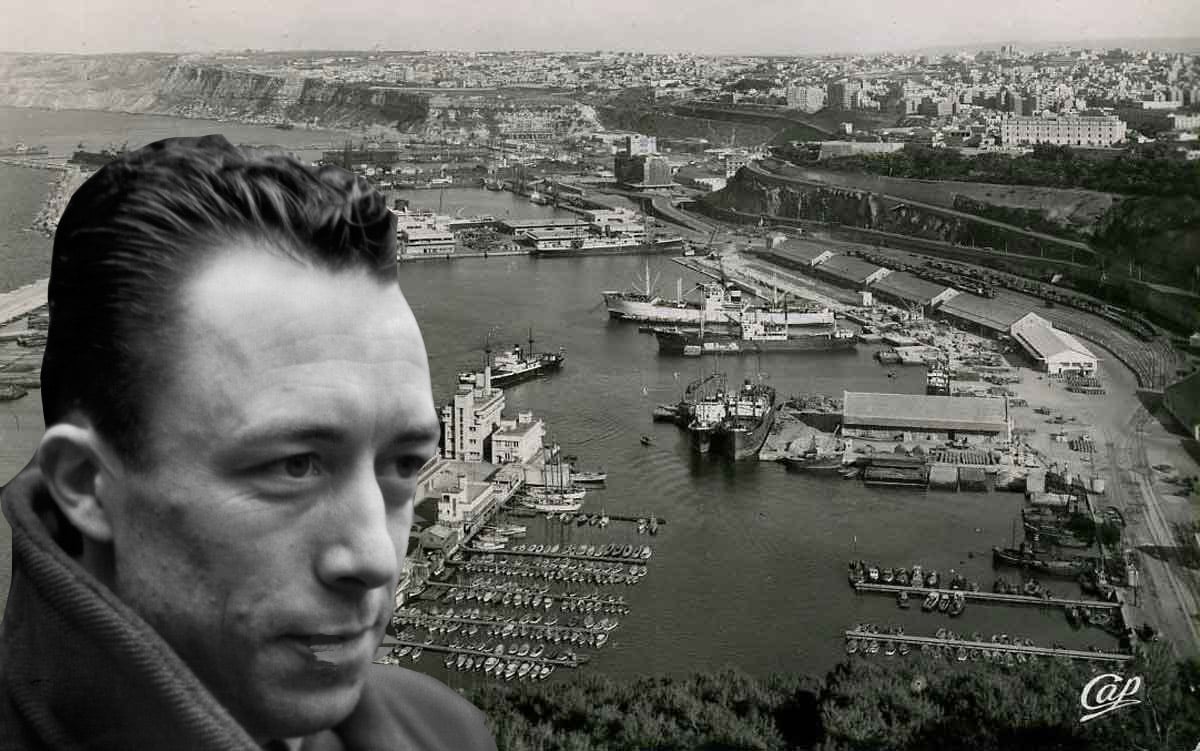On the Topicality and Relevance of Albert Camus, Yesterday and Today. “How do you see the future of humanity?”
"Dear soul, do not strive for eternal life, but exploit what is possible."

All Global Research articles can be read in 51 languages by activating the Translate Website button below the author’s name.
To receive Global Research’s Daily Newsletter (selected articles), click here.
Click the share button above to email/forward this article to your friends and colleagues. Follow us on Instagram and Twitter and subscribe to our Telegram Channel. Feel free to repost and share widely Global Research articles.
***
Introduction to the Theme
In my search for uplifting reading that can offer orientation in these dark times, I came across the works and thoughts of Albert Camus – as I did in the sixties and seventies of the last century.
Camus’s history of influence goes far beyond literature. As a representative of French atheistic existentialism, he not only influenced thinking in the last century about the basic questions of human existence, the role of intellectuals and the individual’s commitment to freedom and justice (1), he still offers fundamental orientation today. He has taken into account the research results of scientific depth psychology.
Although the extensive literary work of the winner of the Nobel Prize for Literature (1957) achieved worldwide recognition, his journalistic work, his articles in libertarian-socialist magazines and his book “Man in Revolt” (1961) are less well-known. They inspired anarchist movements worldwide, led to a reorientation in the post-war period and were the occasion for the confrontation and break with Jean-Paul Sartre in 1952 (2).
A good overview of Camus’ thought and work and comprehensive understanding of man in revolt is provided by the book “Albert Camus – Libertarian Writings (1948-1960)”, edited by the French journalist and translator Lou Marin in 2013 (3).
The best way to describe the brave affirmation of this world in Camus’s work is the sentence of Pindar that precedes the treatise of Camus’s “The Myth of Sisyphus”:
“Dear soul, do not aspire to eternal life, but exhaust what is possible.” (4)
Camus’s final message: “Give when you can. And not hate, if that is possible.”
Camus’s last message, which was to inspire the coming generation (5), was published in the libertarian journal Reconstruir (Reconstruction) on the front page of its January/February 1960 issue. It was Camus’s answer to a questionnaire on the problem of international relations.
Thus the journal asked:
“Do the summit meetings between the representatives of the United States and the Soviet Union give you any hope as to the possibilities of overcoming the Cold War and the division of the world into two antagonistically opposed blocs?”
Camus’ answer: “No. Power makes the one who holds it crazy.” (6)
The final question of “Reconstruir” was: “How do you see the future of humanity? What would it take to arrive at a world less oppressed by necessity and more free?”
To this Camus replied with the well-known “message” to the following generation: “Give when you can. And not hate, if that is possible.” (7)
Hoping for Peace and Fighting for It
 For Camus, nothing was more inexcusable than war and the call to hatred of nations. In his opinion, the West had better things to do than to tear itself apart in wars and quarrels. But once war had broken out, he thought, it was futile and cowardly to stand aside under the pretext that one was not responsible for it (8).
For Camus, nothing was more inexcusable than war and the call to hatred of nations. In his opinion, the West had better things to do than to tear itself apart in wars and quarrels. But once war had broken out, he thought, it was futile and cowardly to stand aside under the pretext that one was not responsible for it (8).
In the French magazine “Défence de l’homme” of 10 June 1949, in response to its observation that the future looked bleak, he added:
“Why? There is nothing more to fear, because we have known the very worst. Therefore, from now on, there are only reasons to hope and fight.”
To the question, “To what end?” he replied, “For peace.”
“I am betting on peace. Therein lies my very own optimism. But you have to do something for it and that will be difficult. Therein lies my pessimism. In any case, today I am solely committed to the peace movements that are trying to spread internationally. On their side are found the true realists. And I am with them.” (9).
In his diary entries of 1939, Camus said that nothing is fixed and everything can be changed; even wars can be prevented:
“There is one fatality, death, and beyond that there is none. In the period that extends from birth to death, nothing is fixed: one can change everything and even put a stop to war and even preserve peace if one wants fervently, strongly and long enough. Principle: seek first what each person has within him of value.” (10).
In the “Pages from the Diary (1939)” in Lou Marin’s book, there is also a letter in which Camus addresses a “despairing man”:
“You write that this war depresses you, that you would be ready to die, but that you cannot bear this worldwide stupidity, this bloodthirsty cowardice and this criminal naivety that still believes human problems can be solved with blood. I read your lines and I understand you. (…)
I understand you, but I can no longer follow you when you make a rule of life out of this despair and want to retreat behind your disgust because everything is useless. For despair is a feeling and not a state. You cannot remain in it. And the feeling must give way to a clear realisation of things. (…).
Today you are convinced that you can no longer prevent anything. This is the crux of the matter. But first you must ask yourself whether you have really done everything to prevent this war. If so, this war might seem like a doom to you and you might take the view that nothing more can be done. But I am sure that you did not do everything that was necessary, any more than any of us. You couldn’t have prevented it? No, that’s not true. This war was not inevitable, you know that. (…).
You have a task, do not doubt it. Every person has a more or less large sphere of influence. He owes it as much to his shortcomings as to his advantages. But be that as it may, it is there and it can be used immediately. Do not drive anyone to riot. One must be sparing with the blood and freedom of others. But you can convince ten, twenty, thirty people that this war was neither inevitable nor is it, that all means have not yet been tried to stop it, that it must be said, written if possible, shouted out if necessary! These ten or thirty people will spread the word to ten others, who in turn will spread it again. If inertia holds you back, well, they start all over again with others. (…).
Individuals are the ones who send us to our deaths today. Why shouldn’t other individuals succeed in giving peace to the world? Only one must begin without thinking of such great goals. Do not forget that war is waged as much with the enthusiasm of those who want it as with the despair of those who reject it with all the strength of their souls (11).
Camus’s Works Are a Training in the Spirit of Revolt
 Camus’s thinking culminates in the call to revolt in the sense of an incessant struggle for a higher degree of freedom. Man who has achieved self-awareness can do nothing but rebel against the conditions of the social order. The form of life that corresponds to him is permanent indignation.
Camus’s thinking culminates in the call to revolt in the sense of an incessant struggle for a higher degree of freedom. Man who has achieved self-awareness can do nothing but rebel against the conditions of the social order. The form of life that corresponds to him is permanent indignation.
When man comes to himself in his abandonment, he can, according to Camus, either choose suicide or resolutely turn to this existence, which only gains meaning through this turning. Indifference is out of the question. The I has called the world absurd and thus professes the will to change this world. To take note of the absurdity of the world means: to rebel against it. In this act of indignation, man finds himself – in a variation of Descartes’ formula: “I indignate – therefore I am!” The clairvoyant human being, who knows himself to be the master of his destiny, subscribes to the spirit of revolt.
Once standing on the standpoint of revolt, the human being sees in his fellow human beings oppressed people of his own kind and sees himself in the community of the suffering, to which he considers himself to belong. However, revolt in the name of human rights and human dignity can never happen for the individual alone – it happens for all human beings: “I revolt – therefore we are!”
For the free human being, there is no higher goal than the realisation of freedom for all. This is precisely the real dedication to the people of the future. True generosity towards the future consists in giving everything to the present.
*
Note to readers: Please click the share button above. Follow us on Instagram and Twitter and subscribe to our Telegram Channel. Feel free to repost and share widely Global Research articles.
Dr Rudolf Lothar Hänsel is a school rector, educational scientist and qualified psychologist. After his university studies he became an academic teacher in adult education. As a retiree he worked as a psychotherapist in his own practice. In his books and professional articles, he calls for a conscious ethical-moral education in values as well as an education for public spirit and peace. For his services to Serbia, he was awarded the Republic Prize “Captain Misa Anastasijevic” by the Universities of Belgrade and Novi Sad in 2021.
He is a regular contributor to Global Research.
Notes
(1) Bouchentouf-Siagh, Zohra and Kampits, Peter (2001). On the topicality of Albert Camus. Vienna Lectures. Vienna
(2) Marin, Lou (ed.). (2013). Albert Camus-Libertarian Writings (1948-1960). Hamburg. Book jacket inside flap
(3) Op. cit.
(4) Camus, Albert (1959). The myth of Sisyphus. Hamburg, p. 7
(5) Marin, Lou (ed.). (2013). Albert Camus-Libertarian Writings (1948-1960). Hamburg, p.363
(6) op. cit., p. 363f.
(7) op. cit., p. 364
(8) op. cit., p. 197
(9) op. cit., p. 81
(10) op. cit., p. 267
(11) op. cit., p. 271ff.


